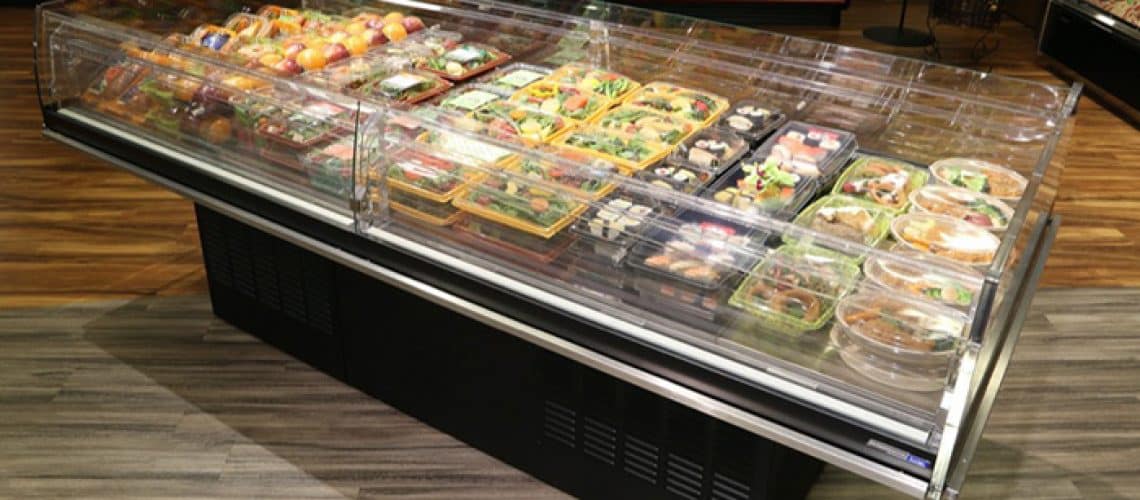Top 3 Reasons Why R-290 Self-contained Cases Are a Good Choice for Grocery Stores

Refrigeration has long been a resource for the food retail industry for preserving products and keeping them fresh during transport and in stores. However, with current and upcoming federal and state laws and/or regulations in place to limit or phase out the use of HFCs in commercial refrigeration systems. Retailers are looking to substitute those refrigerants with natural refrigerant alternatives.
R-290, also known as refrigeration-grade propane and one of the few natural refrigerants readily available, is understood to be a top, viable alternative to HFC refrigerants for freezer and cooler applications, especially in some merchandisers, such as self-contained cases. Though R-290 has been widely used in Europe for over 20 years, in the US, its adoption in food retail stores is still in its infancy.
R-290 self-contained display cases have benefitted food retail establishments across the globe. Here are the top 3 reasons why they are an advantage in grocery stores.
Self-contained R-290 cases optimize store performance
Self-contained display cases charged with R-290 support energy efficiency and provide eco-friendly benefits. Due to its inherent, excellent thermodynamic properties, R-290 permits a smaller refrigerant charge per system, which results in lower operating costs and higher store savings without sacrificing performance. Likewise, when it comes to installation and usage, most R-290 systems have zero to minimal downtime since these systems are not complex to use and are practically plug and play. R-290 display cases can be easily moved around the store and quickly plugged into an available electrical outlet. When it comes to its environmentally friendly benefits, R-290 is known to be a sustainable refrigerant that has an Ozone Depletion Potential (ODP) of zero and Global Warming Potential (GWP) of 3.
Is R-290 flammable? Yes … Is it safe? YES!
Yes, R-290 is flammable; however, it has been safely used for commercial applications for years by campers, in consumer refrigerators, air conditioners, and household freezers. Though flammable, R-290 merchandisers are safe to use since these systems contain very low charges, are self-contained, and are hermetically sealed, meaning the risk of refrigerant leaks is low and the refrigerant does not come near ignition sources. And, in the unfortunate event, a leak does occur, it is environmentally safe since it has such low GWP and ODP ratings. It is important to note that only certified and trained refrigeration technicians should handle R-290 units for proper installation, maintenance, and service of these systems in the store.
R-290 is a future-focused refrigerant
R-290 is a refrigerant of the future, alongside other natural refrigerants, such as CO2 and ammonia. Since R-290 is non-toxic and environmentally friendly, it is exempted from upcoming refrigerant regulations intended to limit or phase out the use of harmful refrigerants. This means that grocery stores that adopt R-290 self-contained display cases today likely will not need to replace their systems in the coming years since they are already compliant with current regulations. Some US states are already fully adopting the use of R-290 systems in the food retail industry and the rest of the US states most likely will follow suit. That is why it is advisable to consider using R-290 systems sooner to achieve regulatory compliance and avoid potential regulatory penalties.
The call for the widespread adoption and transition to environmentally friendly refrigerants in the commercial refrigeration industry is a significant step in putting the damper on global warming and climate change. The use of R-290 is a viable weapon to help mitigate climate change, and unless we do something to eliminate harmful refrigerants in the atmosphere, there will be no end in sight to this enormous threat to our planet and the people that make it their home.
Fresh Thinking...
Categories
- AIM Act
- AMS Group
- Clarity
- Close The Case
- Convenience Store
- Coolgenix
- Deli
- Design Center
- Display Case
- Food Retail
- Food Safety
- Foodservice
- Fresh Prepared
- Grocerant
- Industrial
- Learning Center
- Lighting
- Meal Kits
- Meat
- Merchandising
- Merchandising Matters
- Power Systems
- Refrigeration Regulations
- Refrigeration Systems
- Seafood
- Second Nature & CO2
- Supermarket
- Trends
- Uncategorized
Archives
- March 2025
- February 2025
- January 2025
- October 2024
- July 2024
- June 2024
- March 2024
- January 2024
- October 2023
- May 2023
- April 2023
- February 2023
- January 2023
- December 2022
- November 2022
- October 2022
- September 2022
- August 2022
- July 2022
- June 2022
- May 2022
- April 2022
- March 2022
- February 2022
- January 2022
- December 2021
- November 2021
- October 2021
- September 2021
- August 2021
- July 2021
- June 2021
- May 2021
- April 2021
- March 2021
- February 2021
- January 2021
- December 2020
- November 2020
- October 2020
- September 2020
- August 2020
- July 2020
- April 2020
- February 2020
- December 2019
- October 2019
- July 2019
- June 2019
- April 2019
- March 2019
- January 2019
- December 2018
- October 2018
- September 2018
- August 2018
- July 2018
- June 2018
- November 2017
- August 2017
- July 2017
- October 2016
- September 2016
- August 2016
- July 2016
- June 2016
- May 2016
- April 2016
- March 2016
- February 2016
- January 2016
- November 2015
- October 2015
- September 2015
- August 2015
- July 2015
- June 2015
- May 2015
- April 2015